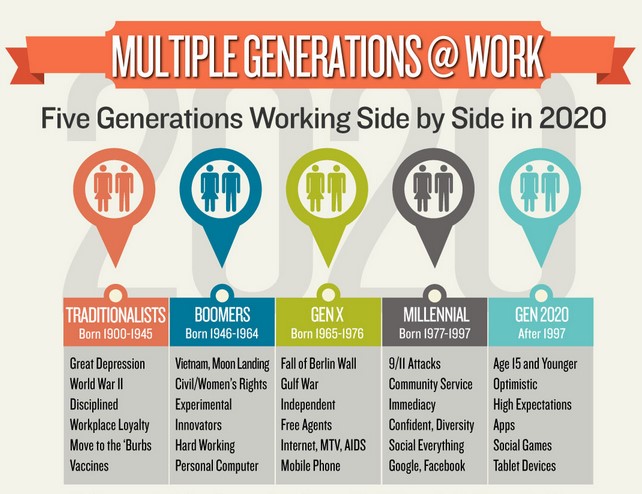Jul
23
2015
Working with five generations: the benefits
By Laura McMillan.
Modern workplaces are going through very interesting times. The UK workforce is more diverse than it's ever been, but when we think of diversity, race and gender are often the first things to spring to mind; we often forget about age and more specifically generation. But here's the thing: many organisations will soon have five generations of employees working side by side.

Image credit: FutureWorkplace
Is this a problem?
It doesn't need to be; after all, intergenerational relationships aren't something new. Many of us have grandparents, or even great-grandparents, and we sometimes even live under the same roof! So we are familiar with other generations and should understand that the key to getting along with people of different ages is the same as that of getting along with people in general: mutual respect, open mindedness and thoughtful communication.
In the workplace, the key to making multigenerational organisations work is embedding the right management culture, approach, values and attitudes.
Harnessing the benefits of a multigenerational workforce
Don’t make assumptions: it may be tempting to make generalisations about the outlooks, values and attitudes of people from different generations but we must never forget how complex and sophisticated human beings are. Never assume, for example, that older people won’t be comfortable using digital technology; remember that Bill Gates is 59 and Stephen Hawking is 73!
Savvy managers know that there is a strong business case for a diverse workforce, and that the underpinning philosophy of managing diversity in the workplace is treating everybody with dignity and respect. When this happens, organisations are able to reap the many benefits of a diverse workforce that feels valued. These benefits include enhanced creativity, innovation, problem solving and an avoidance of group think. Diverse organisations are able to understand the drivers of a wide range of customers, supporters and users. Perhaps the most important benefit is employees that feel valued and respected, regardless of which generation they are from, who will want to reward their employee with commitment, loyalty and a willingness to work their socks off!
Multigenerational working often means that young managers may line manage people considerably older than them. Again, this doesn't need to be a problem as long as it's approached in a thoughtful way.
The earlier point regarding the avoidance of assumptions is key for managers who find themselves in this position. They need to get to know the individuals they manage in order to establish their motivators. It might be the case that a Baby Boomer may not be as motivated by career progression and training as somebody from Generation Y but this won’t always be true.
Walk the walk
A big pitfall for young managers is the temptation to keep asserting who's boss! This generally comes from feeling insecure about managing someone old enough to be your mum or dad, but older members of the team will probably understand the organisational hierarchy better than anyone and don't need it 'rammed down their throat'. Remember, they may well have been managers themselves at one time. The best way to gain their respect is to demonstrate leadership - walk the walk and don't just talk the talk.
Manager’s toolkit
If you want to improve your skills and confidence as a manager, and gain the vital skills required to motivate your team, then our Moving into management course could be exactly what you need.
This practical training course is perfect for new managers or managers with no formal training. Not only will you learn about what it takes to be a good manager and get techniques how to lead your team effectively, but you’ll also get the chance to discuss your current management challenges in a safe and confidential environment.
Read our full course outline or book your place today.
Laura McMillan has over 15 years’ experience as a Learning and Development professional and is a skilled trainer and coach. She has held management positions in the voluntary sector and now works as a consultant across all sectors.


